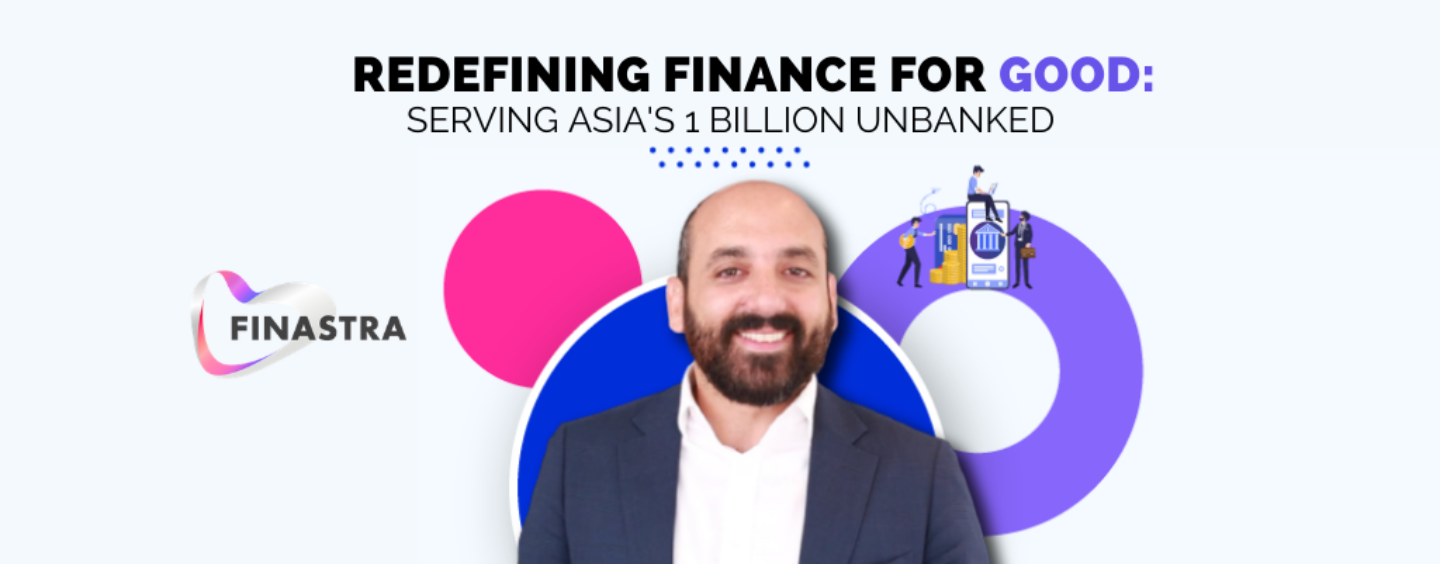
Finance Needs to Be Redefined for Good to Serve One Billion of Asia’s Unbanked
by Fintech News Singapore September 22, 2020As a catalyst for digitalization, COVID-19 will further help improve financial inclusion in emerging economies, according to Wissam Khoury, head of international at Finastra.
Home to an unbanked population of about 1 billions, Asia has experienced a boom in fintech adoption on the back of a rising Internet penetration rate and the ubiquity of mobile phones.
In Thailand, 74% of Internet users access banking through mobile devices, well ahead of the global rate of 41%. In Indonesia, e-money transactions skyrocketed 173% from January 2019 to January 2020. And in Vietnam, though cash remains king, digital payments have surged, jumping 144% per year over the past five years.
COVID-19 is further accelerating the transition towards digital banking, which will ultimately benefit low-income households and small companies.
“The pandemic has brought the future forward and accelerated the drive to digital transformation, so now is the time to enact change across the industry to support individuals, small and medium-sized enterprises (SMEs) and communities,”
Khoury told Fintech News Singapore.
“Further digital innovation in financial services will have a positive effect on financial inclusion.”
Finastra, one of the world’s largest fintech companies, provides banking software and solutions, serving some 8,600 customers including 90 of the world’s largest 100 banks by asset size.
Fintech News Singapore sat down with Khoury to learn more about the state of financial inclusion in Southeast Asia and hear how Finastra has been helping incumbents and fintechs better serve their customers. Khoury also shared his views on how financial companies can leverage technology to tap into financially underserved populations, and delved into how he believes the banking industry will look like in the future.
Fintech News Singapore: What are the financial inclusion issues being faced in Asia today?

Wissam Khoury, Head of International at Finastra, Image via Linkedin
Wissam Khoury: There are 1.7 billion adults in the world without a bank account, 1 billion of which are in Asia. The problem is particularly acute in Southeast Asia, where more than 7 out of 10 adults are either “underbanked” – meaning they have no access to credit cards or have no long-term savings products, for example – or are “unbanked,” without access to a basic bank account. Without something as simple as a bank account, these individuals are excluded from a range of financial services or are forced to use alternate providers that are usually more expensive.
For micro, small and medium-sized enterprises (MSMEs), one of the most fundamental problems is access to finance. Without access to lending, financially excluded businesses become caught in cycles that restrict their capacity to grow and leave them underprepared for shocks such as the current pandemic.
According to the International Finance Corporation, 65 million enterprises, or 40% of formal MSMEs in developing countries across the globe, have an unmet financing need of US$5.2 trillion every year – equivalent to 19% of the gross domestic product (GDP) of these countries. Looking at Southeast Asia specifically, the funding gap has been estimated at over US$300 billion.
Fintech News Singapore: Do you think that the pandemic has unwittingly accelerated positive developments in terms of financial inclusion?
Wissam Khoury: One of the pandemic’s side effects is that it has brought the future forward, with people moving towards digital products and services. Just as some people have realized working from home can have advantages over being in the office, more people have found the benefits of digital banking and payments over cash. This shift had been underway for some time, but it has been greatly accelerated by the pandemic.
This presents a real opportunity for the new generation of digital challenger banks to capture market share, and incumbent banks will also have to respond with strengthened digital offerings.
Further digital innovation in financial services will have a positive effect on financial inclusion.
Fintech News Singapore: What do you think is the missing piece in solving the financial inclusion puzzle? Is it purely based on technology or are there other factors at play that need to be looked into?
Wissam Khoury: Finastra aims to improve the lives of millions of people and businesses through our solutions and our ecosystem.
Technology is the enabler, but collaboration will be crucial. At a time when economies and communities have been hard hit, it’s so important that financial institutions, fintechs, trade bodies and industry groups share our collective expertise to tackle these issues and redefine finance for good.
We are committed to working closely with our customers and partner ecosystem to create new solutions and initiatives that help to accelerate through change and deliver better outcomes for everyone.
This approach to collaboration reflects Finastra’s whole ethos of enabling ‘open finance’. For us it’s about encouraging all ecosystem players, big and small, to contribute and innovate together, making the world of finance and technology more accessible, more equal.
Fintech News Singapore: The COVID-19 pandemic has made access to funding for SMEs even more challenging. What can be done to help ease this situation?
Wissam Khoury: There are some common issues that prevent SMEs from accessing traditional finance. For instance, banks look at traditional metrics like cashflow to determine the creditworthiness of a business, but this is hard to prove for new businesses or the many small firms in Southeast Asia that rely on small cash payments. Another issue is that many banks do not have the cost structure to serve many small businesses at scale, which makes it expensive to process and service loans with little profit.
Fintechs are helping to address these problems with a combination of technology and innovative thinking: for instance, using technology to look beyond traditional metrics to assess a business’s creditworthiness and taking numerous data points into account to get a broader picture of their business. Modern software solutions are also helping banks to streamline processes and find efficiencies, enabling them to lower their costs.
Another way to encourage SMEs is helping them to digitize and Finastra has recently partnered with MasterCard and the Asian Development Bank (ADB) to help build a new digital pathway to credit for wholesalers. Through the application of technology, the program aims to help SMEs digitize trade, making it easier for them to participate in global supply chains.
The program will start in Indonesia with 500 retailers and aims to build to 5,000 retailers by the end of Q1 2021. Innovative partnerships like this one can support the agility and resilience of supply chains, accelerating access to finance and improving efficiency.
Fintech News Singapore: Asia is home to the majority of people in the world without a bank account. How is fintech addressing this problem?
Wissam Khoury: The pandemic has accelerated the move towards digital, and more people than ever are embracing digital banking. This is an opportunity for banks to offer digital products and services to people who may have not been able to access them before, for instance because they live in a rural area with no bank branch, or because they do not have the correct documents to open an account. As banks focus more on digital, we expect financial inclusion to increase in tandem.
A great example of this is Yoma Bank, which was the first bank in Myanmar to launch an online account opening system. In a country where only around 25% of the population holds a bank account, Yoma Bank quickly grew its customer base and gave access to banking services to many for the first time. The bank has been able to provide customers with fast, ultra-secure access to their personal accounts across multiple channels, quickly earning a reputation as a pioneer in Myanmar’s financial services sector.
Another leader is IFIC Bank in Bangladesh. With more than two thirds of the country without a bank account, IFIC saw the opportunity to bring financial inclusion to millions and looked to transform its entire operating model from the outside-in. Using Finastra’s solutions, the bank has differentiated itself with innovative products and services, available in branch and through new digital channels, and aims to bring banking services to 100,000 Bangladeshis in next two years.
Fintech News Singapore: In this context, what does the future of finance look like to you?
Wissam Khoury: Now is the time to redefine finance for good, to build a more inclusive and equal industry. The future will be collaborative, with financial institutions partnering more closely with fintechs to co-create solutions that can impact millions of lives around the world.
The pandemic has brought the future forward and accelerated the drive to digital transformation, so now is the time to enact change across the industry to support individuals, SMEs and communities.
Ongoing “Redefining Finance for Good” interview series with Fintech News
Recently, Fintech News Network in partnership with Finastra has been running an ongoing series of interviews with the industry’s top banking voices as part of the latter’s Redefining Finance for Good initiative.
We spoke with Jeremy Soo, Head of Consumer Banking at DBS as well as Samir Gupta, CEO of Group Consumer Banking at CIMB Group for more insights on how their organisations had responded and adapted to the current pandemic.
Featured image credit: Business card photo created by ijeab – www.freepik.com







